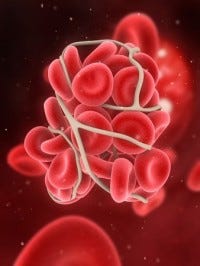Direct thrombin inhibitors associated with heart attack risk in multiple trials

Direct thrombin inhibitors (DTIs) are anticoagulants (blood thinners) most often used as alternatives to heparin and warfarin. DTIs are approved by the FDA for prevention and treatment of venous thromboembolism (deep venous thrombosis and pulmonary embolism) and to prevent blood clots in people with atrial fibrillation.
But multiple randomized trials suggest these widely used anticoagulants might cause heart attacks, prompting some experts to question any advantages DTIs have over other blood thinners.
The injectable or intravenous DTIs like argatroban help bridge patients with heparin induced thrombocytopenia (HIT) to long-term warfarin use. The oral DTI dabigatran (Pradaxa®) is mainly used as a warfarin alternative, eliminating the need for cumbersome monitoring and multiple drug and food interactions.
Dabigatran is the most-prescribed direct thrombin inhibitor, with over $1 billion in annual sales. Industry-funded scientists analyzing data from clinical trials of dabigatran concluded that risk of myocardial infarction was greater among people taking dabigatran 150 mg twice daily, compared to warfarin. In a later randomized trial of more than 1,400 patients taking anticoagulation for prevention of recurrent VTE, those taking dabigatran were significantly more likely to have heart attacks (odds ratio 4.3).
Bivalirudin (Angiomax®) is used for acute coronary syndrome prior to cardiac stenting, but seems to increase the risk of stent thrombosis after PCI, according to three randomized trials.
Argatroban, lepirudin and desirudin are most often used for treatment of heparin-induced thrombocytopenia (HIT). Since these drugs' trials used historical controls rather than a randomized trial design, it's impossible to assess their prothrombotic risk. Subcutaneous fondaparinux (a factor Xa inhibitor) seems to work well for HIT, but physicians must use it off-label (argatroban is FDA approved).
It may seem paradoxical for direct thrombin inhibitors, being blood thinners, to cause blood clots. But it's entirely plausible when considering the nature of the coagulation/anticoagulation cascade, with various proteins (in the natural state) promoting clotting or inhibiting it at different points in the process or under different conditions.
Rivaroxaban (Xarelto®) is a factor Xa inhibitor, not a direct thrombin inhibitor, and seems to reduce heart attack risk (it's being considered for treatment of acute coronary syndrome in the UK).
Dabigatran's lack of a known effective antidote during bleeding complications (unlike warfarin) led to its manufacturer agreeing in 2014 to pay $650 million to settle 4,000 lawsuits from patients experiencing bleeding. (Bayer is facing a similar situation with rivaroxaban). So far, the lawyers don't seem to have caught the scent of the heart attack angle.
Update: a June 2015 article in the New England Journal shows that the monoclonal antibody idarucizumab can immediately reverse the anticoagulation effects of dabigatran.
It's a cautionary tale we've heard before: when it comes to drugs, new is not always better, but does always come with unknown future risks. A commentator in Chest concludes that except in "exceptional circumstances...physicians should avoid prescribing direct thrombin inhibitors."


